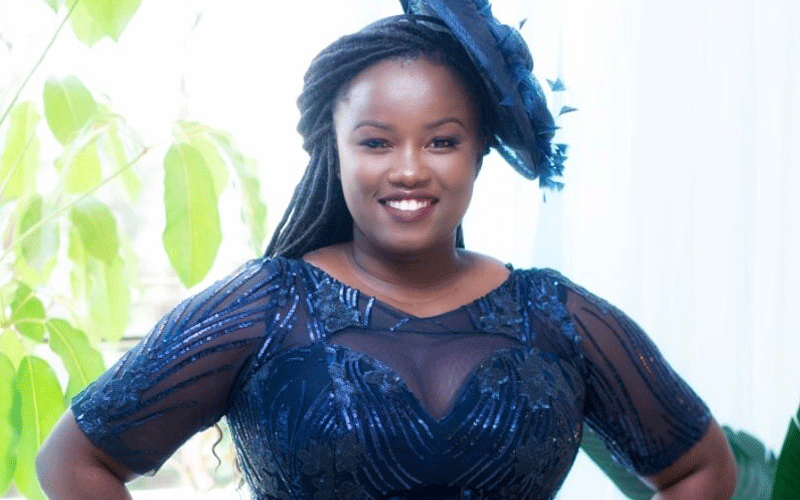Christmas in mourning: Coping with grief
By Christopher Owuor, December 16, 2020
Maria Mbole Muinde has suffered enough loss this year. She lost her husband, father and aunt in a span of seven months. As she spends her first holiday without her loved ones, she shares how she has been fairing.
Harriet James @harriet86jim
Year 2020 has been a tough year for Maria Mbole Muinde. She will be spending her Christmas without her husband, her father as well as her beloved aunt.
It all started on March 3, this year, Maria received the devastating news that the love of her life, Tony Onyango, a rugby player, had passed away after a cardiac arrest.
Three months later, on June, 18, she lost her aunty who was her voice of reason.
“Whenever we had tension in our marriage that was way beyond us, my aunt would always hold me accountable.
This is because Tony was such a quiet and reserved guy and was never confrontational.
When things would go out hand, he chose silence as a coping mechanism, while I was confrontational,” narrates Maria.
After her husband’s death, things got ugly when the mother of one began receiving threatening emails from her in-laws that they would take away the child, alleging she was mentally unstable.

She found closure by developing Tony’s “weird” coping mechanism of silence and failed to respond,” she recalls.
On November 13, another tragedy befell Maria—she lost her father. “Losing a parent is painful. It was heartbreaking to say the least,” she says.
She adds: “The trauma of losing a spouse, the love of my youth, was numbing. When Tony died, it took a while for dad to digest that I was a widow at 29 years.
At some point, he sent my younger brother to my place. He was told to stay with me until he instructed him to go back home. And now, he was no more…” she narrates.
Maria recalls how great of a man her father was in moulding her younger brother into a man and also how he ensured that the family never lacked.
And just like in Tony’s death, Maria turned to writing to process her father’s death and all the losses she has endured this year.
As she wrote, and slowly let go of her bitterness and sadness, many widows came out and related to her story of loss, which later on birthed a support group, Tumaini na Faraja kwa Wajane to assist grieving widows.
“I created this platform to enable us walk with each other through our lonely journey of widowhood.
What I love the most about this group is, we don’t dwell so much on our circumstances.
We don’t let grief define us. We have purposed to love ourselves and take care of our holistic well-being.
Some days are hard, but somehow, we speak positivity over each other. Talking to women who are on the same walk of life as me has been helpful,” Maria reveals.
As Christmas approaches, Maria has fond memories of her father—how he used to roast meat and the road trips that they had together. She also recalls the Catholic songs that he would play.
When she got married, she remembers how she would spend Christmas at her in-laws while the rest of the days till New Year were spent at her parent’s home for the last three years. This way, their son would get to know both sides of the family.
Fond memories
Now that this is the first Christmas alone, Maria dreads how the festive season will be.
“I’ll miss how we all spent time together. How we’d talk and laugh at memories of various seasons in our lives.
I’ll miss how we ate and drank together. Tony and dad loved hosting. They both loved sharing a meal with other people.
They both lived well with people. They were both firm believers of kutenda wema na kuenda zako even when the recipient wasn’t deserving.
They were both humble and extremely gracious. If I can take on the baton and continue with their good deeds, I believe their memories will leave on through my son and I,” narrates Maria
This year, many people are dealing with loss of their loved ones. While Covid-19 death cases continue to be reported daily, others die due to natural causes and other diseases or accidents. Almost everyone can relate with loss.
Psychologist Dr Anthony Ireri says grieving is a process. In psychology, there are five stages of grief. They include denial, anger, bargaining, depression and acceptance.
“Regardless of the stage anyone is in, everyone has their own mourning style and should do it their way without feeling judged. If you feel like talking, talk.
If you feel like writing, write. If you feel like reading self-help books, go for it. If you feel like praying, call upon the name of the Lord your God.
If you feel like meditating, please do so. If you feel like going for counselling, do so.
Don’t let someone project their negative perception over your mental health. The overall goal is not losing yourself to grief,” he advises.
“The thing about grief is, it never stops. It’s the choices we make post-loss that determine the quality of life we live.
As a young widow and a fatherless child, I choose to be happy. I choose to live. I choose to love. I choose to get up, dress up and show up for those that mean the world to me.
I do this because it is the right thing to do. I have chosen not to let my losses define me,” Maria saying in ending.